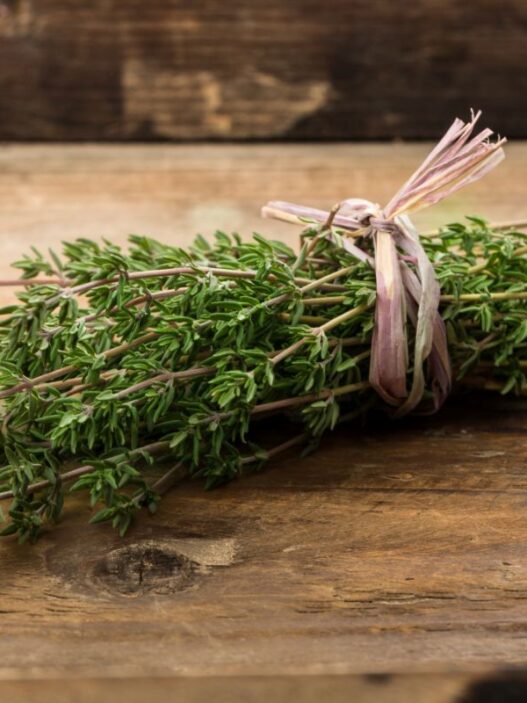Are you dealing with bugs feasting on the precious plants in your home garden!? ??? Time to try rosemary.
The rosemary plant can help you save your yield by repelling various bugs, such as aphids, Mexican bean beetles, cabbage moths, flies, and thrips.
I’ve used rosemary in my garden for years, and in this post I’ll take a closer look at:
- 5 bugs that rosemary repels
- How you can make the most out of this herb to protect your yield

5 Bugs That Rosemary Repels
Hear me out, curious fellows!
Rosemary not only adds a slightly minty, peppery, balsamic taste to your dishes but is also a natural bug-repellent that can save your plants from stunted growth.
Let me break it down for you and see which 5 pests this herb sends packing:
1. Aphids
Aphids are sap-sucking troublesome pests that show up in your garden to start feeding on the plants.
These insects might be small, but they have a knack for producing plant galls, spreading viruses, stunting growth, and causing all sorts of deformities in leaves, flowers, and buds.
But here is where Rosemary steps in as the guardian of your green sanctuaries. Its strong scent has the superpower to attract the natural enemies of aphids, including:
- Ladybugs
- Lacewings
- Chickadees
Think of it as inviting the aphid-hunting team to a party where they feast on these unwanted guests. But that’s not all! Rosemary contains volatile oils, which have an incredible repellent effect on aphids that signals them to move out of your garden.
To make ends meet, mix 4-5 drops of thyme, rosemary, peppermint, and clove with 1 cup of tap water in a spray bottle and spray it on your plants with aphids to shoo them off.
You can also strategically plant Rosemary around your garden to keep those pests at bay.
2. Mexican Bean Beetles
Beans are staple in many gardens, but they are often targeted by Mexican bean beetles. These insects might look like harmless little creatures, but trust me, they are no friends to the plants and can ruin your whole crop.
Mexican bean beetles feed on the stem, leaves, and beans of the plants and can even make them die in extreme causes.
Much like their other insect counterparts, Mexican bean beetles also cannot stand the strong smell of rosemary. So why not plant this herb near your bean rows or create a perimeter with it around the patches to give those pests a one-way ticket out of your garden?
With this aromatic defender on your side, your bean plants will start growing strong and healthy again.

3. Cabbage Moths
Now, let’s tackle those cabbage-munching villains: the Cabbage Moths! These sneaky pests are huge troublemakers for cabbages and their close relatives, broccoli, brussels sprouts, and cauliflower (and even kohlrabi and mustards!)
These little pests are like leaf-eating machines that can turn your lush garden into holey messes. But here is where our superhero, Rosemary, swoops in to save the day!
The cabbage moths cannot stand the intense and aromatic scent of Rosemary. So, if you are dealing with the relentless onslaught of Cabbage Moths, it’s time to plant these herbs in your veggie garden to form an odor barrier.
4. Flies
Carrot flies are tinny terrors that might not feed on your precious carrot crop themselves, but they do know how to make a mess of your home garden.
These flies are attracted to your garden due to some scent from the carrot plants, and they are not shy about laying their eggs in the soil near your carrot patch.
Here’s where the real trouble begins! The larvas sneak their way into the roots of your carrot and start a disaster underground.
By the time you notice something, the damage is already done, and you may witness:
- Root rot
- Stunted plant growth
- Discoloration of foliage
Besides that, fungus gnats and fruit flies are also not only known for sucking out the cell content of your plants, but their larvae can cause real havoc. Wondering how? Well, just like the carrot flies, they can infest the soil, feed the roots of the plants and prevent their growth.
But don’t worry! Growing Rosemary in your garden can save the day and repel these flies, too, just like other bugs on the list. In the case of carrots, the aroma from the herb will mask the scent from the plants, like a free VPN service.
5. Thrips
Thrips are small critters that can wreak havoc on indoor or outdoor plants. They are notorious for hindering plant growth, causing those leaves, buds, and flowers to look papery and distorted.
Let’s not forget about the tiny pale spots they leave behind and cause the plant leaves to drop prematurely.
Here’s where our gardening hero, Rosemary, comes in for the rescue! The mere presence of this herb reduces the settlement of female thrips species and their eggs.
For this, grab some mild liquid soap like Castile or Ivory, mix it with 1 quart of water, and toss in a few Rosemary leaves.
Mix it all up in a spray bottle, and you have got yourself a thrip-repellent! Give your plants a gentle spritz and say goodbye to these bugs.
Does Rosemary Attract Anything?
Alright, here is the matter of worry! While Rosemary does work its magic to repel bugs, it is not entirely immune to attracting a few unwelcome visitors, which can affect the growth of your planted crops.
Some of these pesty insects Rosemary attracts are:
- Mason bees
- Bumblebees
- Spittlebug
- Whiteflies
- Thrips
- Leafhoppers
- Spider mites
Before you start fretting and questioning your decision to grow Rosemary around your plants, just remember that every garden has its share of positive, negative, or neutral interactions towards this herb.
What’s important is how you understand them and take steps to tackle unexpected challenges.











